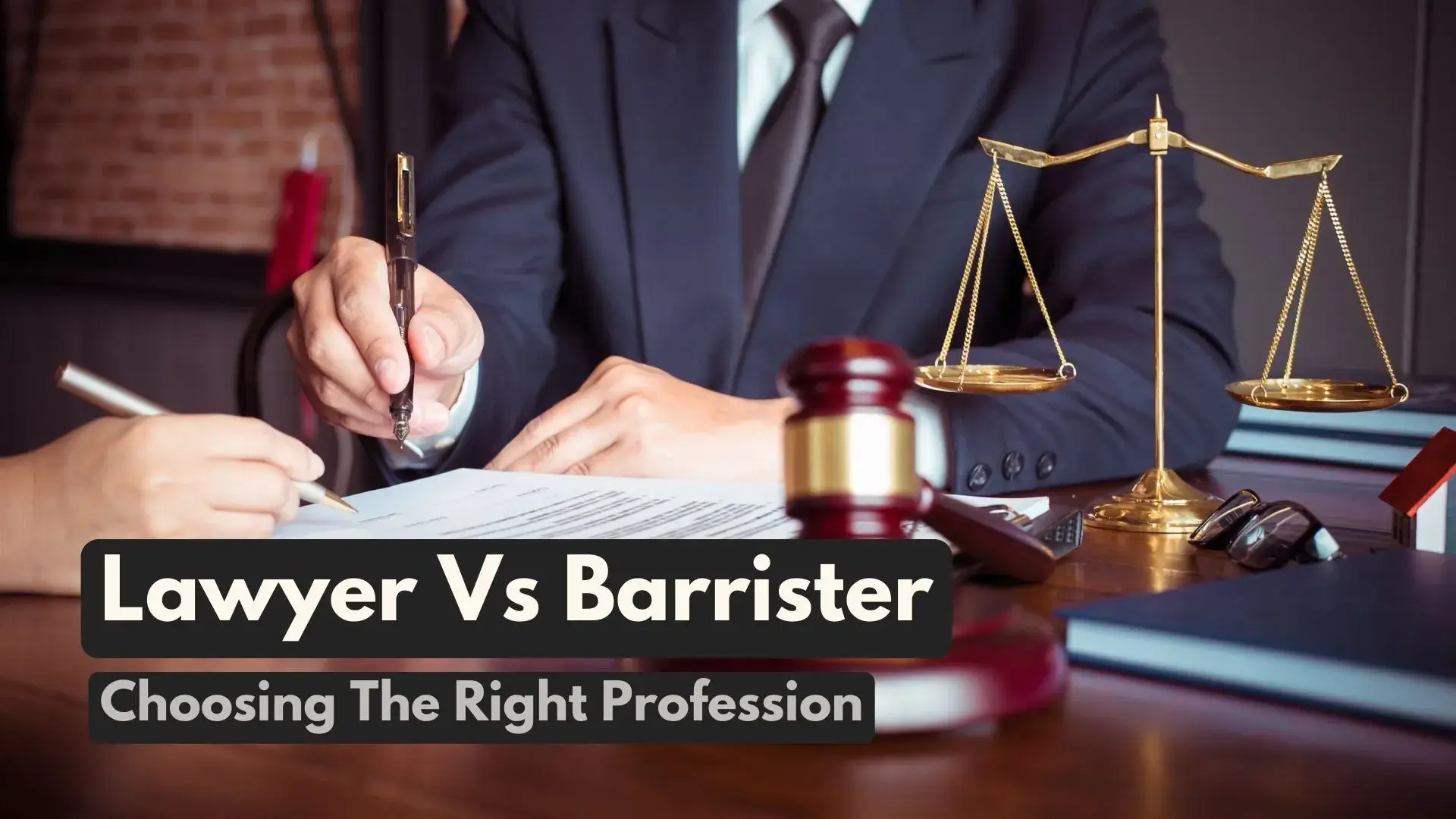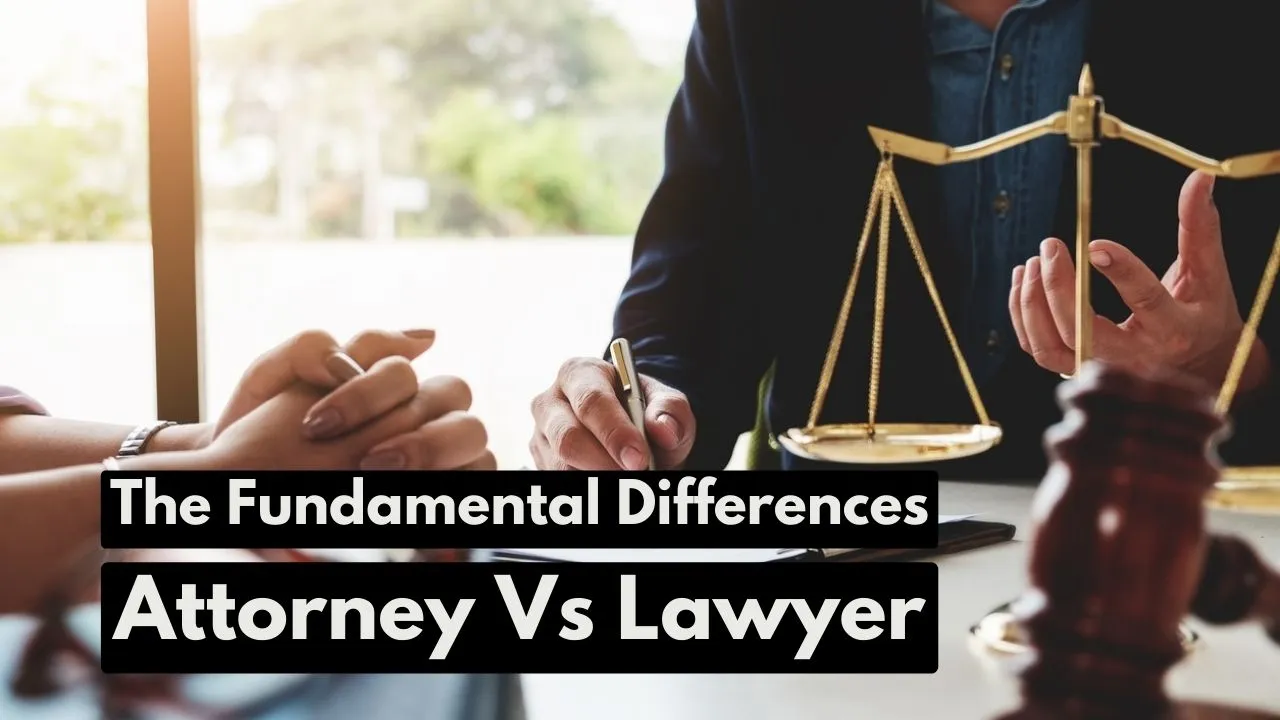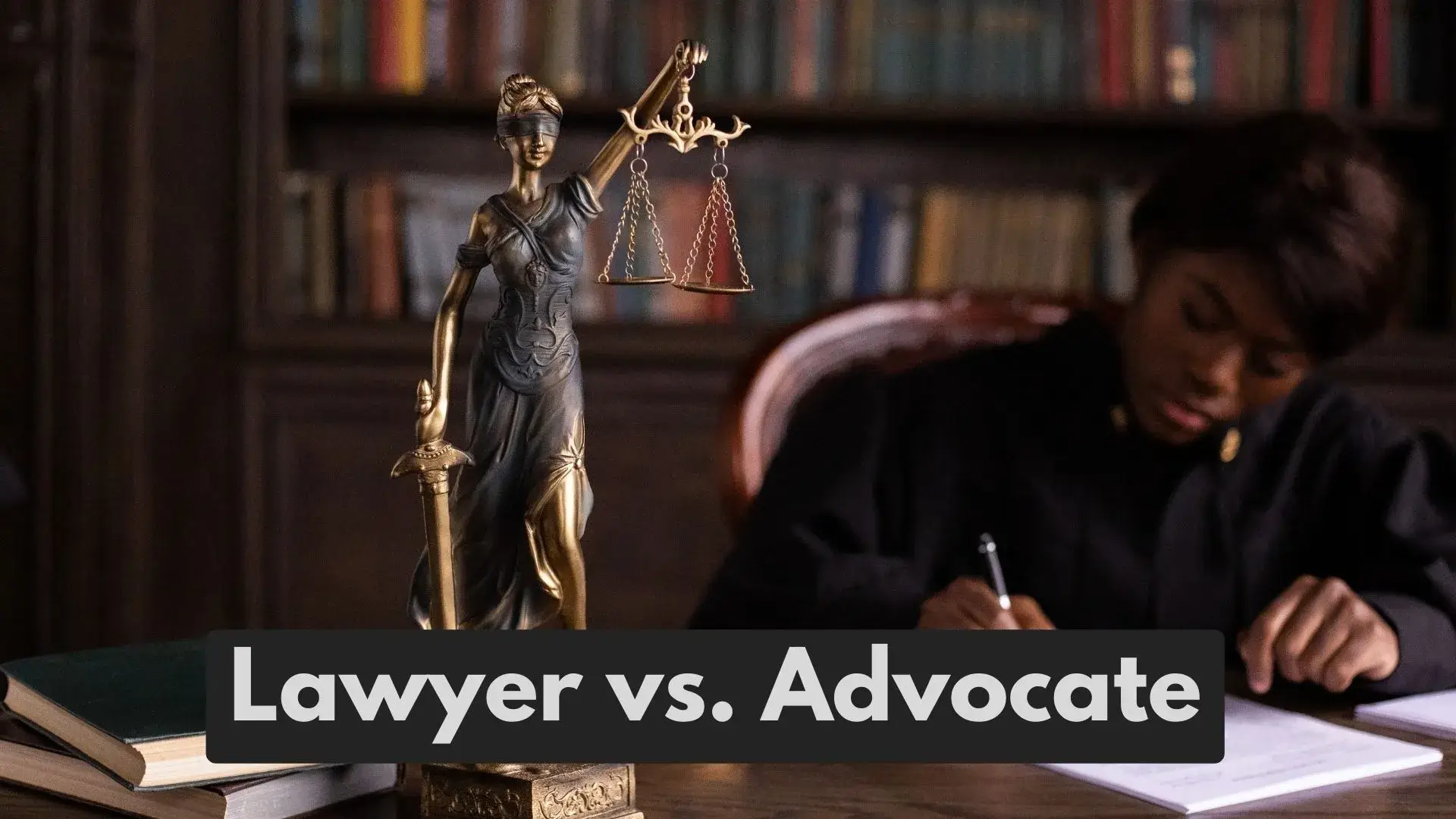If you’ve ever found yourself in need of legal assistance, you might have come across the terms “lawyer” and “barrister.”
While both these professionals are part of the legal system, they have different roles, responsibilities, and qualifications.
In this article, I’ll walk you through the differences between a lawyer and a barrister, helping you understand their unique roles and how to make an informed decision when seeking legal representation.
Legal matters can be complex and overwhelming, often requiring the expertise of legal professionals.
Lawyers and barristers are two primary types of legal practitioners who play distinct roles within the legal system. Understanding their differences can greatly impact the outcome of your legal case.
The Key Differences Between Lawyers And Barristers
Certainly, here’s a table summarizing the key differences between lawyers and barristers:
| Aspect | Lawyers | Barristers |
|---|---|---|
| Role | Provide legal advice, draft documents, negotiate, and represent clients in various legal matters | Specialize in courtroom advocacy, represent clients in higher courts, focus on trial and appellate work |
| Scope of Work | Handle a wide range of legal tasks and cases | Primarily focus on litigation and advocacy in court |
| Client Interaction | Often have direct client contact | Limited to practice in the jurisdiction of their bar association |
| Attire | No specific dress code in most cases | Wear traditional court attire (robes, wigs) |
| Training and Pathway | Law degree, legal training, possible bar exam | Law degree, legal training, pupillage (work under experienced barrister), bar exam (if applicable) |
| Legal Representation | Can represent clients in various courts | Can represent clients in higher courts (appellate) |
| Advocacy | Not exclusively focused on courtroom advocacy | Primarily focused on courtroom advocacy and argument |
| Fee Structure | Typically charge by the hour or a flat fee | Often paid through solicitors, share fees with solicitors for referral cases |
| Independence | Generally work in law firms or as sole practitioners | Independent and may work from chambers |
| Precedent | May set precedent through case outcomes | Often argue based on established legal precedents |
| Geographic Limitation | Can practice in various jurisdictions | Limited to practicing in the jurisdiction of their bar association |
Defining Lawyers And Barristers

✅ Lawyers
A legal expert who offers clients advice, direction, and representation in a variety of legal matters is referred to as a lawyer in general. Family law, criminal law, and corporate law are just a few of the many legal specialties available to attorneys.
✅ Barristers
Lawyers who concentrate on advocacy and litigation are known as barristers. They are frequently asked to speak on behalf of clients in court, make arguments, and offer legal counsel in challenging situations.
✅ Role and Responsibilities of an Esquire
Education and Training Required Lawyer and Barrister
✅ To Become Lawyer
One normally follows a set school and training path to become a lawyer. Although each jurisdiction may have different rules, generally speaking, the following stages are typical:
➡️ Educational Foundation
Undergraduate Degree: Start off by completing a bachelor’s degree in any subject. Although no specific major is necessary, courses in political science, history, philosophy, or English can be helpful because they place a strong focus on communication and critical thinking.
➡️ Law School
After completing your undergraduate studies, you must enroll in law school to get a Juris Doctor (JD) degree. Normally, it takes three years to complete law school full-time. It is important to do your research and choose a reputable law school that fits your career objectives and provides a rigorous legal program.
➡️ Legal Training
Bar Association Approval: You must pass the bar exam in the jurisdiction where you intend to practice law before you may start practicing. Your understanding of the law, legal procedure, and ethical standards are evaluated on the bar exam. Given that passing is a necessity to practice law, it is imperative to study diligently for this exam.
➡️ Optional Steps
Specialization: You may choose to specialize in a specific area of law, such as criminal law, corporate law, family law, or intellectual property law, after passing the bar exam. For some specializations, some jurisdictions can demand further training or certificates.
Advanced Degrees: In order to build competence in a specific legal area or to improve their job prospects, some lawyers obtain higher degrees such as an LL.M.
Gaining
➡️ Professional Experience
Continuing Legal Education (CLE): To stay current on legal changes and maintain their licenses, several jurisdictions mandate that practicing attorneys complete a predetermined number of hours of continuing legal education each year.
➡️ Experience and Practice
Internships and Clerkships: Gaining real-world experience through internships, clerkships, or working as a paralegal can give you insightful knowledge about the legal field while you are still in law school or right after you graduate.
➡️ Associate Attorney
Many new lawyers begin their careers as associate attorneys at law firms or government organizations after passing the bar exam. Under the supervision of lawyers with more experience, this is an opportunity to obtain real-world knowledge.
➡️ Ethical Standards
Professional Responsibility: High ethical standards are expected of lawyers. Upholding these standards is crucial to safeguarding the integrity of the legal profession and preserving a positive reputation.
➡️ Admission to the Bar
Licensure: You must submit an application for admission to the bar association in your jurisdiction after passing the bar exam. Application submission, character references, and sometimes passing a background check are required for this.
A commitment to constant study, hard effort, and perseverance are necessary to become a lawyer.
Working at law firms, business legal departments, governmental agencies, non-profit organizations, academia, and other settings is only one of the many job options available in the legal field.
As they can change depending on where you live and the kind of legal activity you intend to engage in, it is important to research the specific requirements in your jurisdiction.
✅ To Become Barrister
To become a barrister, you’ll need to follow a specific educational and training path that is common in many English-speaking jurisdictions, particularly in countries with a common law legal system. Here’s the typical process:
➡️ Educational Foundation
Undergraduate Degree: Begin by completing a bachelor’s degree in any subject. While there is no specific major required, subjects that enhance your critical thinking, research, and communication skills are beneficial.
➡️ Law Degree
LL.B. or Graduate Diploma in Law (GDL): In some jurisdictions, you can directly enter a law degree program after completing your undergraduate studies. Alternatively, you can first complete a non-law degree and then take a conversion course like the Graduate Diploma in Law (GDL) or Common Professional Examination (CPE) to qualify for legal studies.
➡️ Bar Professional Training Course (BPTC)
After completing your LL.B. or equivalent, you’ll need to undertake the Bar Professional Training Course (BPTC). This course focuses on developing practical advocacy, research, drafting, and negotiation skills necessary for a career as a barrister. It usually takes around one year to complete full-time.
➡️ Pupillage
After successfully completing the BPTC, you’ll need to secure a pupillage, which is a period of practical training and apprenticeship under the supervision of an experienced barrister. Pupillage provides hands-on experience in a barrister’s daily work, including representing clients in court, legal research, and drafting legal documents.
➡️ Qualification as a Barrister
Called to the Bar: Upon completing pupillage, you will be “called to the Bar” by the relevant bar association in your jurisdiction. This marks your official qualification as a barrister, allowing you to practice independently.
➡️ Professional Development
Continuing Professional Development (CPD): Like other legal professionals, barristers are required to engage in continuing professional development activities to stay updated on legal developments and enhance their skills.
➡️ Chambers or Independent Practice
After being called to the Bar, you can choose to join a barristers’ chambers or practice independently. Barristers’ chambers are groups of barristers who share resources and administrative support while practicing individually.
➡️ Ethical Standards
Upholding ethical standards is crucial for barristers. They are expected to adhere to the Bar’s Code of Conduct, which outlines professional responsibilities and conduct.
Becoming a barrister requires a strong commitment to legal education, practical training, and the development of advocacy skills. It’s important to research the specific requirements and procedures in your jurisdiction, as they might have variations in the path to becoming a barrister.
Roles and Responsibilities
![Role and Responsibilities of an Esquire [ Esquire Title, Esquire Definition & More ]](https://thelegalstories.com/wp-content/uploads/2023/05/shutterstock_1038948943-1.webp)
Lawyers: Lawyers are primarily responsible for advising clients, drafting legal documents, negotiating settlements, and providing general legal support. They often work directly with clients to understand their needs and offer legal solutions.
Barristers: Barristers focus on advocacy and litigation. They are usually instructed by solicitors to represent clients in court proceedings, cross-examine witnesses, and present legal arguments. Barristers are specialists in courtroom advocacy.
✅ Lawyer Esquire [ Importance, Role, Fees, & Working Guide ]
Appearances in Court
Lawyers: While lawyers can represent clients in court, they generally handle a broader range of legal tasks outside of the courtroom.
Barristers: Barristers specialize in courtroom representation and are usually called upon by solicitors to handle complex litigation matters.
Client Interaction
Lawyers: Lawyers often have direct and frequent interactions with clients. They provide ongoing legal advice and ensure that clients understand the legal processes related to their cases.
Barristers: Barristers usually have limited direct contact with clients and primarily communicate through solicitors who instruct them.
Scope of Practice
- Lawyers: Lawyers cover a wide spectrum of legal matters and can provide comprehensive legal services to clients.
- Barristers: Barristers have a narrower focus on advocacy and litigation, particularly in more complex or specialized cases.
Legal Fees
- Lawyers: Lawyers usually charge fees based on the services they provide, which can include hourly rates, flat fees, or contingency fees.
- Barristers: Barristers’ fees are often structured differently, with a focus on individual cases or specific court appearances.
Collaboration and Consultation
- Lawyers: Lawyers often collaborate with other professionals, such as paralegals and legal assistants, to manage various aspects of a case.
- Barristers: Barristers collaborate with solicitors who instruct them, ensuring a unified and strategic approach to the case.
✅ Lawyer Vs Attorney: Choosing The Right Profession
When to Choose a Lawyer

If you require a broad range of legal services, such as legal advice, document preparation, negotiations, and representation outside the courtroom, hiring a lawyer is a suitable choice.
Lawyers are well-equipped to handle various legal matters and provide ongoing support.
Your legal requirements and the specifics of your case will determine whether you should choose a lawyer or a barrister. In the following situations, you might pick a lawyer rather than a barrister:
✅ General Legal Advice and Services
A lawyer might be more appropriate if you require legal advice on a variety of matters, including contracts, business transactions, family law, or estate planning.
Lawyers can offer advice and support in a variety of legal areas and have a wider range of practice.
✅ Transactional Matters
A lawyer’s expertise in these areas can be quite helpful if you are involved in legal transactions that call for the writing of documents, negotiating terms, or performing due diligence.
✅ Direct Client Interaction
A lawyer can be a better option if you want to work closely with them throughout your case and want direct communication with your legal counsel. Compared to barristers, lawyers frequently have more direct interactions with clients.
✅ Lower-Cost Legal Services
In some cases, lawyers may provide more affordable options for legal matters that don’t necessitate full courtroom representation. They may charge on a fixed price or an hourly basis, and their fee schedules may be more flexible.
✅ Lower-Level Courts
A lawyer may not be necessary in cases that will be heard in lower courts or administrative bodies. Attorneys frequently focus on work for higher courts and on appeals.
✅ Geographic Flexibility
A lawyer is a smart choice if your legal problem includes several locations because they can practice in many different jurisdictions and regions.
✅ Diverse Legal Expertise
A lawyer’s broad legal expertise might be helpful if your legal matter crosses multiple legal areas, such as a commercial dispute involving contract and property law.
✅ Non-Contentious Matters
The ability of a lawyer to use alternative dispute resolution processes, such as mediation, arbitration, or negotiation, might be helpful if your case requires settling legal matters out of court.
Also keep in mind that the particulars of your case, your legal requirements, and the laws in your area will determine whether you choose a lawyer or a barrister.
You can make an informed decision based on your particular circumstances by consulting with legal experts and seeking their advice.
✅ Understanding Esquire Titles – Definition – Roles
When to Choose a Barrister
It is advisable to engage the services of a barrister in situations where the legal issue at hand entails intricate litigation, necessitates the use of specialist advocacy abilities, or calls for representation in a court of law.
Barristers have exceptional proficiency in articulating legal arguments and adeptly maneuvering complex legal matters within the confines of the courtroom.
✅ Courtroom Advocacy
If your case involves litigation and will be heard in court, a barrister’s expertise in courtroom advocacy can be crucial. Barristers specialize in presenting legal arguments and evidence in a compelling manner before judges and juries.
✅ Higher Courts and Appellate Work
If your case is being escalated to a higher court, such as an appellate court, a barrister’s experience in handling complex legal issues and presenting appeals can be advantageous.
✅ Specialized Legal Knowledge
If your legal matter is highly specialized and requires in-depth knowledge of a particular area of law, a barrister with expertise in that field can provide focused and effective representation.
✅ Objective Analysis
Barristers often provide an objective perspective on legal matters. If you need an impartial assessment of your case, a barrister can analyze the strengths and weaknesses without being emotionally involved.
✅ Conflict Resolution and Mediation
Barristers are skilled negotiators and can help facilitate resolution through mediation or negotiation, especially when dealing with contentious disputes.
✅ Complex Legal Issues
For cases involving intricate legal concepts, precedents, or constitutional matters, barristers can navigate and argue these complexities effectively.
✅ Legal Strategy and Case Preparation
Barristers excel at devising strategic legal approaches and meticulously preparing cases, including researching legal precedents and crafting persuasive arguments.
✅ Independence and Impartiality
Barristers maintain independence from clients and are instructed by solicitors. This can be advantageous for ensuring unbiased advice and advocacy.
✅ Cross-Examination
If your case involves cross-examining witnesses, a barrister’s skill in extracting relevant information and challenging opposing witnesses can be valuable.
✅ Referral from Solicitors
In many legal systems, barristers are often engaged through solicitors, who refer cases that require specialized advocacy and expertise.
✅ Legal Complexity
If your case involves complex legal issues that require in-depth analysis and interpretation, a barrister’s focused expertise can provide strong legal representation.
Choosing a barrister is particularly suitable when your case demands specialized legal skills, courtroom representation, and the expertise to navigate intricate legal matters.
Consulting with solicitors and legal professionals can help guide your decision based on the specifics of your case.
✅ When Can You Use Esquire After Your Name – With Example
Selecting the Right Professional
When making a decision between a lawyer and a barrister, it is important to take into account the specific nature of the legal matter at hand, the level of complexity involved in the case, and the financial resources available to you.
Engaging in a collaborative effort with both a lawyer and a barrister, if deemed essential, can yield a thorough legal strategy.
Conclusion
In the realm of legal representation, both lawyers and barristers play integral roles.
While lawyers offer diverse legal services and comprehensive support, barristers specialize in courtroom advocacy and complex litigation.
Understanding their distinct functions will empower you to make the right choice when seeking legal assistance.
✅ Lawyer vs. Attorney vs. Esquire: Understanding the Distinctions
FAQs Related Lawyer vs. Barrister
What is the main difference between a lawyer and a barrister?
The primary distinction lies in their roles and responsibilities. Lawyers provide a wide range of legal services, while barristers specialize in advocacy and courtroom representation.
Can a lawyer appear in court?
Yes, lawyers can represent clients in court, but they often handle various legal tasks outside of the courtroom as well.
When would I need to hire a barrister?
You might consider hiring a barrister when dealing with complex litigation, specialized court representation, or intricate legal matters.
Do barristers directly communicate with clients?
Barristers usually communicate through solicitors who instruct them, maintaining a more focused and specialized approach.
Can I benefit from both a lawyer and a barrister?
Absolutely. Collaborating with both professionals can provide a comprehensive legal strategy, especially when dealing with multifaceted cases.








Leave a Reply